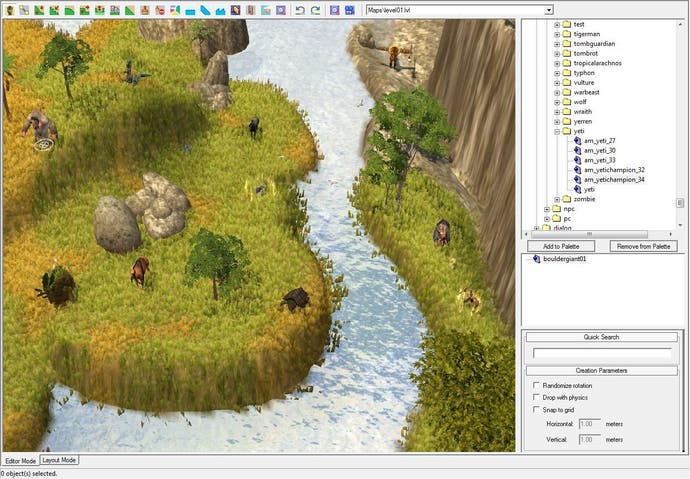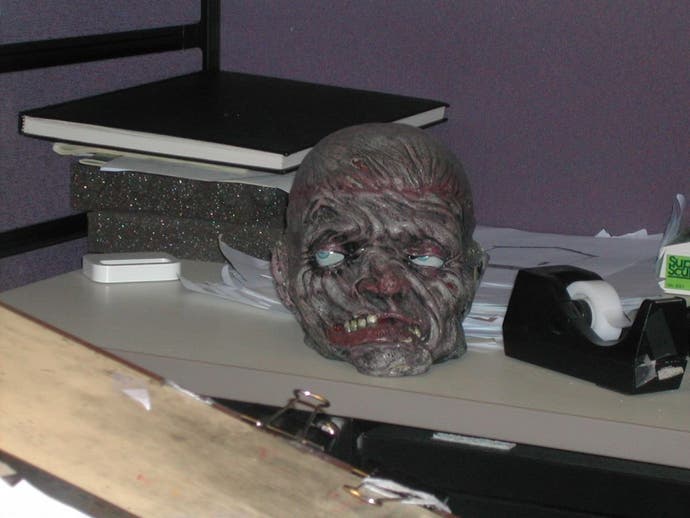Retrospective: Titan Quest
Battling the gods.
It was Creation. The order of this level coming into existence matched that of many creation myths from many religions, not least the Genesis account of the creation of the world in seven periods. For years we've used the expression "God Game" to describe a genre of management sims, but this was the true God Game. It was being a creator god to a land in which you would then play.
Ontological ludology fnarr
André Bazin, the father of film theory, argued in his 1945 essay - The Ontology of the Photographic Image - that with the advent of the camera painting took on two distinct roles: "the expression of spiritual reality wherein the symbol transcended its model," and "the duplication of the world outside." In going on to argue that the camera is a more pure means of capturing the surface of the world - a desire he attributes to our innate human need to capture the creation of a God in whose image we are made - he states that, as Peter Matthews of the BFI puts it, "the act of photographing the world testifies to the miracle of God's creation."
It's my contention that videogame level editors are at once a forward and backward step in this same process.
The camera, Bazin argues, freed painting from its previous obsessive need for realism and allowed it to become more abstract, more interpretive. With film we get that much closer to documenting reality, and with each evolution of film that Bazin lived to see - colour film, sound, 3D - we took a step nearer.

Surely videogames are on the same journey, that constant desperation to improve graphics, to increase fidelity, such that we can think we're watching live football with a casual glance at the latest FIFA or Pro Evolution Soccer. They are yet another human attempt to capture the world. But, I hesitantly suggest, perhaps they're more. Perhaps they're our desire to create our own worlds, to emulate the role of a creator.
Of course games obfuscate Bazin's theories. They attempt to capture reality, while simultaneously attempting to be paintings. But my bare knowledge of film theory and ontology means I'm already so far out my depth my hat is floating loose on the surface of this subject. All I know for sure is: I saw this Titan Quest developer creating with the level editor, and wondered if he rested on the seventh day.
Taking a fall
I've had a go with the level editor that comes bundled with the game (although hidden away in the sub directories), and I'm rubbish at it. I'm clearly a far better player than creator. But there's one more tenuously teleological nature of such things I want to throw out there.
Pressing play is the Fall. When you create a level in a level editor, it's perfect. It's pristine, untouched. It's a bountiful land filled with potential. And sure, I may have packed it with satyr soldiers and archer skellingtons, but right now their murderous intents have not come into being. They merely rock on their feet, a looping animation routine, as peaceful as the swaying tree or circling gull.

Were I to load the level up at this point they'd remain equally placid. It's not until I put a player character into the scene and press play that the perfection descends into murder and violence.
And of course until I add a player and press play, it's intensely boring and completely meaningless. Its existence is only meaningful when it's interpreted by a conscious mind. I'm just saying.
And deflate
So, that's my retrospective of Titan Quest. I mean, I probably should have written about how excellent it is that the spell animations scale up as you level up, meaning there's a really rewarding aesthetic feedback as you progress, that takes away from the fact that since the enemies level up as quickly as you do, that progression is essentially non-existent. And said about how funny it is to walk off while someone's talking to you, and hear their sentence fade out as if they've just noticed they're talking to themselves.
I'll also add that if you're going to play it - and I strongly suggest you do, as it's fab - get the Immortal Throne expansion with it, since it improves the original game dramatically with many useful additions and extra collectables.
But for me, it will always be about that odd moment in that studio, watching the level creation, and thinking: blimey, he's playing God.
